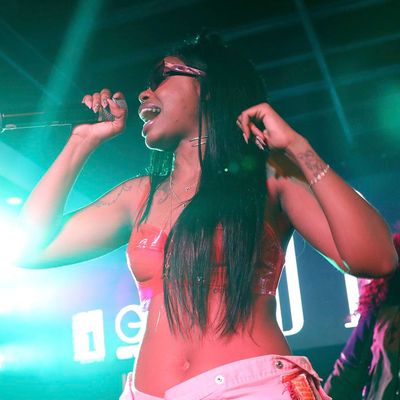
Every week, Vulture runs through the best, most interesting, and sometimes most confusing rap releases. In this installment: Sada Baby, of “Bloxk Party” fame shows off his range, Dreezy continues to impress, Boogie cements his status, and V Don, Willie the Kid, and Eto do throwback New York rap right.
Sada Baby, Bartier Bounty
Virtually every A-lister in rap dropped an album last year (I say “virtually” because Lil Uzi Vert spent most of 2018 working through dance tutorials on Instagram). But one of the two or three best songs in the genre — and one of the most inescapable, at least as nights out crept closer to last call — was “Bloxk Party,” by a pair of then-little-known rappers from Detroit, Sada Baby and Drego. “Bloxk Party” is unique in an era of songs constructed by engineers from never-ending noodled freestyles in that the two rappers pass the mic back and forth and work off one another’s verses; it’s a force of nature because those verses are instantly memorable and delivered with absolute vitriol. Sada Baby compares his “big-ass shotgun” to a young Finnish center on the Chicago Bulls, then threatens to “fuck the party up with my dance moves.” No one who’s heard this song has forgotten it.
Bartier Bounty does not have another “Bloxk Party” (though, this being the streaming era, it does have “Bloxk Party”), but it does have almost a dozen songs that are within shouting distance. The tape reveals Sada Baby as a vocalist with surprising range: There are points where you’re sent lunging for the credits to see if it’s Sada or Boosie, and other moments when he strips Young Thug’s approach of its warbling and keeps its acrobatics. He fits comfortably within the stylistic world of contemporary Detroit street rap — driving beats, careening flows packed with menace — and is an endlessly colorful writer, like when he taunts, “Your bitch kids love me like Frozen.”
Dreezy, Big Dreez
No one tell Interscope, but one of the reasons Big Dreez works so well is that its stakes are almost aggressively low. The Chicago rapper and singer is a monster talent who, for some reason, did not become a national star with 2016’s No Hard Feelings — a tour de force where she out-rapped Gucci Mane, exhumed T-Pain, and made an absolutely perfect pop song with Jeremih. It peaked at No. 101 on the Billboard 200.
At just ten songs and a half-hour long, Big Dreez is far less ambitious, but nearly as effective. She sings as well as Jeremih and Jacquees and gets the better of Offset and Kash Doll; she turns pointed phrases in the middle of difficult technical runs. The best songs are the singles, but Dreezy is still staggeringly versatile. The album benefits from a pair of beats by the now-perplexingly underutilized London on da Track, and from contributions by Pi’erre Bourne and Southside. Big Dreez renders industry prospecting inane; if we can get Dreezy, operating near this level, every 18 months for the next few years, we’ll be far better for it.
Boogie, Everything’s for Sale
Speaking of Interscope: When the major signed Boogie in 2015, the Compton rapper seemed as if he would translate to a broad audience with punishing songs like the Jahlil Beats–produced “Oh My,” which was then becoming a massive regional hit, or slyly high-concept ones like “Bitter Raps,” which had first turned heads locally. Now nearly 30, Boogie finds himself being shuffled around — a mixtape from 2016, Thirst 48, Pt. II, seemed to tread water creatively and commercially, and so the following year, he found himself shoehorned onto the Shady Records roster. Boogie’s music can be clever, writerly, and provocative, so this might have been a natural fit in 2003. But it was difficult to imagine him and current Eminem existing in the same universe, and Shady has been a notorious graveyard for once-promising young artists.
Fortunately, Everything’s for Sale (a) exists and (b) has a stylistic point of view completely independent of the label boss. That point of view is a slow, soft, contemplative one — somewhere between Telefone and To Pimp a Butterfly. Boogie was very good at making heavier music (revisit “Oh My” if it’s been a while), but this direction pays dividends as well. In the past, on mixtapes like The Reach, his introspective songwriting would be cordoned off into one section while his more raucous raps stayed in another corner. This had the effect of making records that might have had no label interference at all seem over-A&Red. Here, the personal reckonings flow more naturally through nearly everything.
V Don, Willie the Kid, and Eto, Heather Grey EP
Heather Grey is close to the platonic ideal of mean, deliberate, and unique New York rap that so many fans and critics are always wringing their hands about, because it’s supposedly all gone. V Don, the son of a Harlem DJ, is an inventive producer even when working from familiar molds; Eto and Willie the Kid (the latter is actually from Grand Rapids, Michigan) are razor-tongued and hungry.
More From The Week in Rap
- The Return of Missy Elliott, Icon
- What Does Jay-Z Hope to Gain From the NFL?
- Everything to Know About A$AP Rocky’s Arrest and Detainment in Sweden

